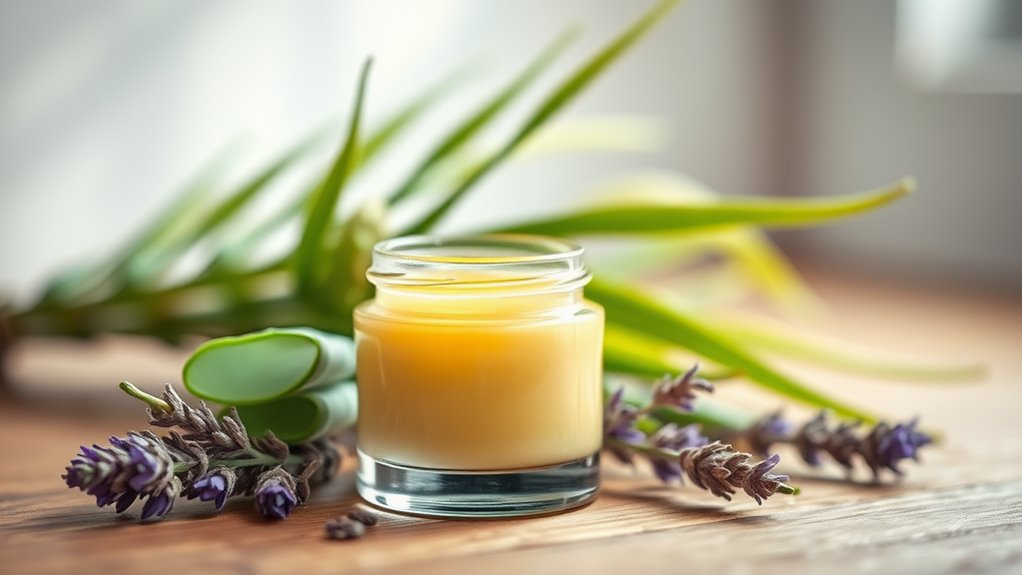A Cold Sore Remedy That Actually Works Fast!
Imagine your skin is a battlefield, and cold sores are the enemy that strikes when you least expect it. It’s frustrating when that familiar tingle appears, signaling an impending outbreak. But what if you could arm yourself with a remedy that works fast? Discovering the right mix of treatments can greatly reduce discomfort and speed recovery, but not all solutions are created equal. So, what’s your best line of defense against these unwelcome invaders?
Key Takeaways
- Apply topical creams containing docosanol or benzyl alcohol immediately at the first sign of a cold sore for faster healing.
- Use antiviral medications like acyclovir or valacyclovir to inhibit virus replication and reduce outbreak duration.
- Cold compresses can quickly reduce swelling and soothe irritation, providing immediate relief from discomfort.
- Aloe vera gel promotes healing and reduces inflammation when applied 2-3 times daily to the affected area.
- Maintain a healthy immune system with a diet rich in Vitamin C and consider lysine supplements to prevent future outbreaks.
Understanding Cold Sores: Causes and Symptoms
Cold sores are primarily caused by the herpes simplex virus (HSV-1). You might notice them as small, fluid-filled blisters around your lips or mouth.
Symptoms can include tingling, itching, or burning sensations before the blisters appear. They typically break open and crust over, lasting about a week.
While there’s no cure for the virus, various cold sores remedies can help reduce symptoms and speed healing. Keeping your immune system strong and avoiding triggers like stress or sunburn can also prevent outbreaks. Identifying personal triggers is key to managing the frequency of outbreaks.
Stay alert for those early signs!
Natural Remedies for Quick Relief
When you’re looking for quick relief from cold sores, natural remedies can be a game changer.
Aloe vera offers soothing properties that can speed up healing, while tea tree oil provides antiviral benefits to help combat the virus. Additionally, using cold compresses can reduce swelling and soothe irritation, enhancing your comfort during an outbreak.
Incorporating these remedies into your routine may just help you feel better faster.
Aloe Vera Benefits
Aloe vera is a powerhouse plant known for its soothing properties, making it an excellent natural remedy for cold sores. Its gel can help reduce inflammation, speed up healing, and provide instant relief from discomfort. Applying aloe vera directly to the affected area can create a protective barrier, preventing further irritation.
| Benefit | Explanation | How to Use |
|---|---|---|
| Soothes Pain | Reduces burning and itching | Apply fresh aloe gel directly |
| Promotes Healing | Accelerates skin repair | Use 2-3 times daily |
| Antiviral Properties | Helps combat virus activity | Apply at first sign of outbreak |
| Moisturizes Skin | Prevents dryness and cracking | Apply regularly |
| Reduces Inflammation | Calms redness and swelling | Apply as needed |
Tea Tree Oil
Tea tree oil is a potent natural remedy for cold sores that offers quick relief thanks to its antiviral and anti-inflammatory properties.
To use it effectively, dilute a few drops of tea tree oil with a carrier oil, like coconut or olive oil.
Apply this mixture directly onto the cold sore using a cotton swab, ensuring not to touch surrounding skin.
You can repeat this process two to three times daily for best results.
Remember, tea tree oil’s strong aroma might be intense, but its healing abilities can help speed up recovery and minimize discomfort.
Give it a try!
Over-the-Counter Treatments That Work
Over-the-counter treatments can be effective in managing cold sores and alleviating discomfort.
These products are easy to find and can speed up healing. Here are some options you might consider:
- Topical creams with docosanol or benzyl alcohol
- Lip balms containing SPF to protect from sun exposure
- Pain relievers like ibuprofen or acetaminophen for discomfort
- Cold compresses to reduce swelling and soothe irritation
- Hydrocolloid patches to protect the sore and keep it moist
Using these treatments can help you feel better and get back to your routine quicker. Additionally, maintaining good oral hygiene practices can further support the healing process. Always read the instructions carefully for best results.
The Role of Antiviral Medications
Antiviral medications play a crucial role in managing cold sores, particularly during outbreaks.
When you start feeling that familiar tingle, taking antivirals like acyclovir or valacyclovir can greatly reduce the duration and severity of your symptoms.
These medications work by inhibiting the herpes virus’s ability to replicate, helping your body’s immune system combat the infection more effectively.
You’ll often notice faster healing and less discomfort when you start treatment early.
While they’re not a cure, incorporating these medications into your care plan can make a world of difference in your cold sore management.
Don’t hesitate to consult your doctor for guidance.
Lifestyle Changes to Prevent Outbreaks
To keep cold sores at bay, it’s essential to make some lifestyle changes.
Focusing on stress management, eating a balanced diet, and protecting your skin from the sun can greatly reduce your risk of outbreaks. Additionally, preventive measures such as applying broad-spectrum sunscreen can help minimize the risk of sunburn, which may trigger cold sore outbreaks.
Stress Management Techniques
Managing stress effectively is essential for minimizing cold sore outbreaks, as heightened anxiety can trigger the virus.
By incorporating stress management techniques into your routine, you can reduce the frequency of these flare-ups.
Here are some practical strategies to explore:
- Practice mindfulness or meditation daily
- Engage in regular physical activity
- Prioritize sleep and establish a consistent sleep schedule
- Connect with friends or family for support
- Explore hobbies or activities that bring you joy
Healthy Diet Choices
A balanced diet plays an essential role in preventing cold sore outbreaks. By incorporating specific foods, you can boost your immune system and reduce the frequency of outbreaks. Focus on a variety of vitamins and minerals that support overall health.
Here’s a quick guide to helpful foods:
| Food Type | Examples | Benefits |
|---|---|---|
| Fruits | Oranges, Berries | High in Vitamin C |
| Vegetables | Spinach, Broccoli | Rich in antioxidants |
| Proteins | Chicken, Fish | Supports immune function |
| Whole Grains | Quinoa, Brown Rice | Stabilizes blood sugar |
Make these choices for better health!
Sun Protection Strategies
Protecting your skin from the sun is essential for preventing cold sore outbreaks.
UV rays can trigger these painful sores, so implementing sun protection strategies is vital.
Here are some effective tips to keep your skin safe:
- Apply broad-spectrum sunscreen with at least SPF 30.
- Reapply sunscreen every two hours, especially if you’re swimming or sweating.
- Wear wide-brimmed hats to shield your face.
- Seek shade during peak sun hours (10 AM to 4 PM).
- Consider wearing protective clothing with UV-blocking fabric.
Home Remedies to Soothe Discomfort
How can you find relief from the discomfort of a cold sore?
Start by applying a cold compress to the affected area.
This can help reduce swelling and numb the pain.
Aloe vera gel is another excellent option; its soothing properties can promote healing and ease irritation.
You might also try honey, known for its antiviral and anti-inflammatory benefits.
Additionally, over-the-counter topical creams containing lidocaine can provide temporary relief.
Don’t forget to stay hydrated and maintain a balanced diet to support your immune system. Incorporating dietary changes can also help minimize outbreaks and support overall oral health.
These home remedies can greatly ease your discomfort while your cold sore heals.
When to Seek Professional Help
While home remedies can provide relief from the discomfort of a cold sore, there are times when professional help is necessary.
If you notice any of the following signs, don’t hesitate to consult a healthcare professional:
- The cold sore lasts longer than two weeks.
- You experience severe pain or discomfort.
- The sore frequently recurs.
- You develop a fever or swollen lymph nodes.
- The cold sore spreads to your eyes or other areas.
Seeking timely help can prevent complications and guarantee you receive the appropriate treatment for your cold sore. Additionally, if you experience symptoms like signs of dehydration, it’s crucial to seek care promptly.
Don’t ignore your symptoms; your health is important!




